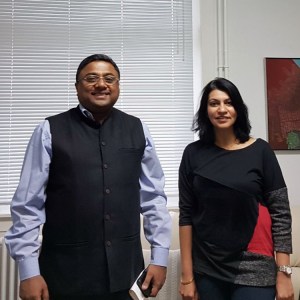As of November 2017, Ambassador George took office in Bern as the new Ambassador of India to Switzerland. Like his predecessors, he is also the Indian Ambassador to Liechtenstein and The Holy See (Vatican).
A brief background
Ambassador George joined the Indian Foreign Service (IFS) in 1993 and began his diplomatic career in Cairo, serving in the Mission as Political Officer. He then moved to the Indian Embassy in Doha and later became the Political Counsellor in Indian High Commission in Islamabad. Washington DC was his next call, where he played the role of Political Counsellor and Commercial Counsellor at Indian Embassy. Following this, both in Tehran and Riyadh, he was designated as the Deputy Chief of Mission in Indian Missions.
At headquarters of Ministry of External Affairs in New Delhi, he served in East Asia Division and was the coordinator of India -Africa Forum Summit. He later headed Administration, Establishment and Welfare Divisions.
The Ministry of External Affairs awarded him the S.K. Singh Award for Excellence in Indian Foreign Service in 2014.
Ambassador Sibi George comes from the Kottayam district in Kerala.
In his first interview with Namaste Switzerland, he tells us more about his role and vision.
What is the mandate of an Ambassador – at professional and personal level?
H.E. Mr Sibi George: An Ambassador of a country represents his Government, the President and the people of the country. – professionally and personally.
A diplomat is not just one designated person really – it’s his or her whole family that is involved and evolves in the role. Joice, my wife, involves herself with the local art scene wherever we are posted. My son is involved in the local activities at school. This is the case of all officers of the Embassy and their families.
To represent India in Switzerland is a great honour. India, as we all know, is a huge nation of several millennia of civilization and, as a country, it plays an important role in the committee of nations today. India and Switzerland have an excellent relationship that has been built over decades. Switzerland and India respectively have their own identity, culture and history. It is that identity and history which brought the two countries together in 1948; a time when India signed its first-ever Treaty of Friendship with a foreign country.
Are there specific goals or plans to mark the 70th anniversary of a positive relationship between the two countries?
H.E. Sibi George: Yes. We plan to organise a series of events spanning across the year to commemorate that friendship treaty signed seven decades ago. Switzerland is a very important country situated right in the centre of Europe and our relationship is reaching a very important phase.
As an Ambassador, it’s my responsibility to work with every individual and stakeholder to further cement and support this relationship. This equation is not made by me or by any one person. It’s a relationship well established over decades by lots of individuals and groups.
Whether it’s a child who sings an Indian song, a dancer who performs a form of an Indian art, an industrial who invests in either of the two nations, an exporter or importer, or leaders – they all together bind and build the relationship. It’s my responsibility to ensure this is further cemented, maintained and further grown.
The task of every ambassador is to further strengthen and grow the relationship with the host country; in my case, with all three: Switzerland, Liechtenstein and The Holy See.
In January, Prime Minister Modi was here. He had a fruitful interaction with Swiss President Alain Berset. In fact, in the last three years, the Prime Minister Modi has interacted with all three Swiss Presidents: Ms Doris Leuthard, Mr Schneider-Ammann, and the current Swiss President, Mr Alain Berset.
I now need to build on these meetings they had. I need to follow-up on decisions taken at the meetings, and at the WEF. Leadership gives guidelines and takes decisions – these are huge economic, cultural, and political interactions. The embassy has to follow up and ensure leaders’ thoughts are implemented.
A relationship isn’t a one-way street. India and Switzerland benefit mutually. There are around 300 Indian students at the ETH, Zurich. There are Swiss students in Indian universities, too. We have 250 Swiss companies present in India and over 100 Indian ones in Switzerland. The presence of each country in the other has grown. India has a lot to offer in the areas of business, culture and tourism. The world is looking at us.
There are 24,000 Indians living here. Your message to them…
 H.E. Sibi George: Indians worldwide are known for their hard work. Any country with a sizeable Indian population will acknowledge the immense contributions of Indians. At the same time, India is an open and democratic society where everyone has an opinion and the right to express it. That is in our blood. And everyone has different opinions. This difference of views and ideas are always welcome and this is our strength.
H.E. Sibi George: Indians worldwide are known for their hard work. Any country with a sizeable Indian population will acknowledge the immense contributions of Indians. At the same time, India is an open and democratic society where everyone has an opinion and the right to express it. That is in our blood. And everyone has different opinions. This difference of views and ideas are always welcome and this is our strength.
Switzerland is like a garden. The Indian community is part of the garden. We are a different variety of flowers in this garden. We add to the diversity. So we stand out, yet merge and make the garden more beautiful.
Team Namaste Switzerland welcomes H.E. Sibi George in his new position as Ambassador of India to Switzerland, Liechtenstein and the Holy See (The Vatican) and thanks him for this interview.
Here is a video message from the ambassador for the readers of Namaste Switzerland.
Disclaimer: Written in good faith, we do not undertake any financial/reputational impact or other obligations/liabilities that may arise from the content.












